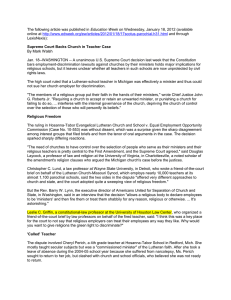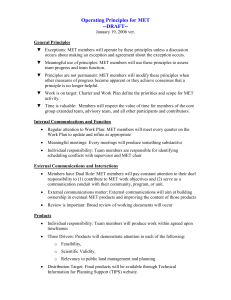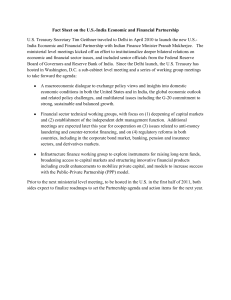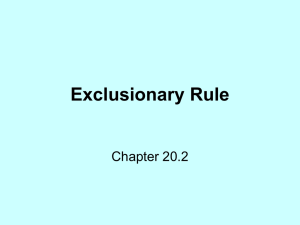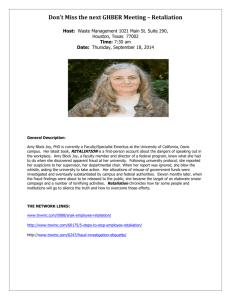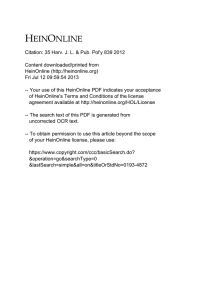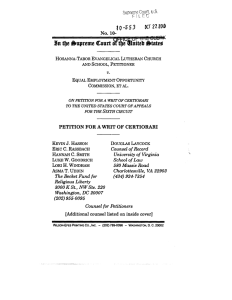Document 10958996
advertisement
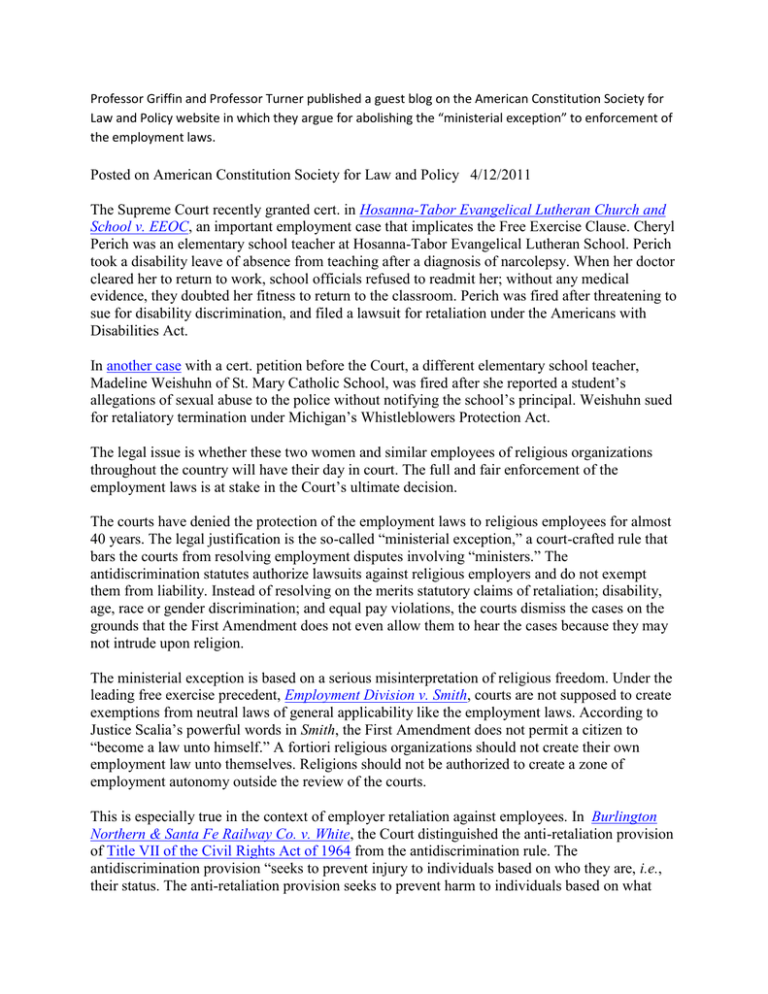
Professor Griffin and Professor Turner published a guest blog on the American Constitution Society for Law and Policy website in which they argue for abolishing the “ministerial exception” to enforcement of the employment laws. Posted on American Constitution Society for Law and Policy 4/12/2011 The Supreme Court recently granted cert. in Hosanna-Tabor Evangelical Lutheran Church and School v. EEOC, an important employment case that implicates the Free Exercise Clause. Cheryl Perich was an elementary school teacher at Hosanna-Tabor Evangelical Lutheran School. Perich took a disability leave of absence from teaching after a diagnosis of narcolepsy. When her doctor cleared her to return to work, school officials refused to readmit her; without any medical evidence, they doubted her fitness to return to the classroom. Perich was fired after threatening to sue for disability discrimination, and filed a lawsuit for retaliation under the Americans with Disabilities Act. In another case with a cert. petition before the Court, a different elementary school teacher, Madeline Weishuhn of St. Mary Catholic School, was fired after she reported a student’s allegations of sexual abuse to the police without notifying the school’s principal. Weishuhn sued for retaliatory termination under Michigan’s Whistleblowers Protection Act. The legal issue is whether these two women and similar employees of religious organizations throughout the country will have their day in court. The full and fair enforcement of the employment laws is at stake in the Court’s ultimate decision. The courts have denied the protection of the employment laws to religious employees for almost 40 years. The legal justification is the so-called “ministerial exception,” a court-crafted rule that bars the courts from resolving employment disputes involving “ministers.” The antidiscrimination statutes authorize lawsuits against religious employers and do not exempt them from liability. Instead of resolving on the merits statutory claims of retaliation; disability, age, race or gender discrimination; and equal pay violations, the courts dismiss the cases on the grounds that the First Amendment does not even allow them to hear the cases because they may not intrude upon religion. The ministerial exception is based on a serious misinterpretation of religious freedom. Under the leading free exercise precedent, Employment Division v. Smith, courts are not supposed to create exemptions from neutral laws of general applicability like the employment laws. According to Justice Scalia’s powerful words in Smith, the First Amendment does not permit a citizen to “become a law unto himself.” A fortiori religious organizations should not create their own employment law unto themselves. Religions should not be authorized to create a zone of employment autonomy outside the review of the courts. This is especially true in the context of employer retaliation against employees. In Burlington Northern & Santa Fe Railway Co. v. White, the Court distinguished the anti-retaliation provision of Title VII of the Civil Rights Act of 1964 from the antidiscrimination rule. The antidiscrimination provision “seeks to prevent injury to individuals based on who they are, i.e., their status. The anti-retaliation provision seeks to prevent harm to individuals based on what they do, i.e., their conduct.” In other words, a court applying the anti-retaliation provisions must focus on “the challenged retaliatory act, not the underlying conduct that forms the basis of the Title VII complaint.” Claims of unlawful retaliation thus present issues and concerns that must be addressed and resolved independently of the merits of employee lawsuits alleging disability, gender, age or other proscribed discrimination in the workplace. Application of the ministerial exception frustrates the purpose of the neutral and generally applicable retaliation provisions. The ministerial exception focuses only on ministerial status in order to dismiss legitimate lawsuits. In the retaliation context, the ministerial exception silences employees seeking to report the misconduct or illegal behavior of their employers, thus creating a lawless zone of employer autonomy inconsistent with the Court’s interpretation of free exercise in Smith. The Court could enforce its decisions in Burlington Northern and Smith and rule narrowly that the ministerial exception does not apply to retaliation suits. We think the Court would do better to abolish the exception entirely and encourage the courts to apply the neutral employment laws of general applicability, allowing all employees to pursue their rights and have their day in court. The parties to Hosanna-Tabor are currently debating the contours of the ministerial exception instead of calling for its abolition. The circuit courts have split over the appropriate test to define minister, disagreeing over whether to use the “primary duties” test or other case-by-case approaches. Picking one test or another to define a minister will not solve the problem that under any standard allowing the exception undermines the employment laws. One practical problem with the exception is that courts have expanded it beyond any plausible definition of “minister.” Music and math teachers, organists, choir directors and secretaries have fallen victim to its claims. Ironically, churches that do not ordain women as ministers or priests have successfully blocked their non-ministerial employees’ lawsuits by labeling them ministers right after they file the claim. The rule thus disproportionately affects those who most need the protection of employment laws, namely women, racial and ethnic minorities, the aged and the disabled. It renders the specific terms of their employment contracts meaningless and unenforceable just by the defendant employer’s invocation of the word minister. It is time for the Court to say that religious organizations cannot become a law unto themselves.
